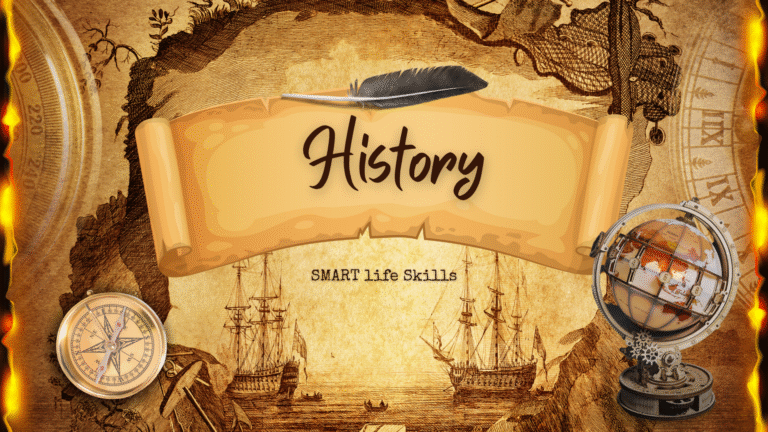History is more than just a collection of dates, names, and events. It is the analytical study of the human past—interpreting evidence, constructing narratives, and understanding how societies change over time. Historians do not merely record facts; they interpret them, drawing meaning from the causes and consequences of human actions. This article presents an overview of key topics in the field of history, from political and economic narratives to cultural, environmental, and digital history, offering a comprehensive understanding of the discipline’s scope and relevance.
1.0 Political and Military History
For centuries, history as a discipline was dominated by political and military narratives. This traditional approach, often referred to as “high politics”, focused on rulers, battles, treaties, and the state. Classic examples include studies of the Napoleonic Wars or the development of the British Empire (Arnold, 2000). These narratives helped shape national identities and were closely tied to state-sponsored education systems.
Military history, as a subfield, examines strategies, technology, and the experience of soldiers. While it has been critiqued for glorifying conflict, newer approaches emphasise the human cost of war and the experiences of non-combatants (Booth, 2007).
2.0 Social History
Emerging in the mid-20th century, social history marked a radical shift in focus. It asked new questions: What was life like for ordinary people? How did workers, women, or enslaved individuals shape their societies? This “history from below” broke away from elite-centric narratives, bringing attention to family life, labour, migration, and health.
According to Jordanova (2019), social history was part of a broader movement influenced by Marxist and feminist theory, focusing on structures of power and inequality. The rise of quantitative data analysis also enabled historians to study demographic patterns and economic trends more systematically.
3.0 Economic History
Economic history explores the production, distribution, and consumption of goods and services through time. From the rise of capitalism to the industrial revolution and globalisation, this field investigates how economies evolve and how material conditions shape societies.
Platt (2002) argues that economic historians blend statistical analysis with narrative history, often relying on interdisciplinary tools from economics and sociology. Key debates include the origins of capitalism, economic imperialism, and the causes of financial crises.
4.0 Cultural and Intellectual History
Cultural history studies human expression—art, literature, religion, rituals, and symbols—while intellectual history examines the development of ideas and philosophies. These fields seek to understand how people interpret the world and create meaning.
The study of the Renaissance, Enlightenment, or Romanticism falls under this category. Koselleck and Richter (2011) highlight how conceptual history (“Begriffsgeschichte”) traces the evolution of political and moral terms, showing how language shapes political thought.
5.0 Environmental History
A more recent development is environmental history, which examines the relationship between humans and the natural world. This includes studies of deforestation, climate change, urban pollution, and agricultural practices.
The growing impact of the Anthropocene—the current geological era shaped by human activity—has made this subfield increasingly vital. According to Bülow and Söderqvist (2014), environmental historians explore how societies have modified their surroundings and how nature has, in turn, influenced human history.
6.0 Gender and Feminist History
Feminist history critiques traditional narratives for marginalising women’s experiences. It re-centres history by focusing on women’s roles in family, labour, politics, and culture. Gender history extends this by analysing how gender norms and identities are constructed historically.
Jordanova (2019) notes that feminist historians not only recover forgotten women but also challenge the frameworks used to write history, offering more inclusive methodologies.
7.0 Postcolonial and Global History
In a world increasingly shaped by globalisation, historians have moved beyond Eurocentric frameworks. Postcolonial history analyses the legacies of empire, focusing on resistance, cultural hybridity, and the voices of colonised peoples.
Global history aims to trace cross-cultural interactions—trade, migration, disease, and war—on a worldwide scale. Weller (2014) describes it as a way of understanding “entangled histories” and rethinking the boundaries of historical inquiry.
8.0 Digital History and New Methods
The digital revolution has transformed the practice of history. Digital archives, data mining, and geographic information systems (GIS) now support large-scale analysis. Digital history not only offers new tools but also raises ethical questions about access, preservation, and the authenticity of sources.
As Cooper and Dewe (2008) note, this field represents a paradigm shift, allowing historians to explore massive corpora of texts and visual material in innovative ways.
9.0 Public History and Memory Studies
Public history brings historical knowledge into museums, documentaries, monuments, and social media. It engages directly with communities and seeks to make history accessible and relevant.
Closely related is memory studies, which examine how societies remember—or forget—the past. Trist and Murray (1990) argue that collective memory often shapes identity and political action more powerfully than objective historical accounts.
10.0 Historical Methods and Sources
A key aspect of historical training is source criticism—the rigorous assessment of documents, oral accounts, artefacts, and digital media. Historians must ask: Who created this source? Why? What biases or gaps does it contain?
Platt (2002) emphasises the importance of methodological awareness, as history is not merely “what happened”, but an ongoing interpretation grounded in evidence.
The study of history is diverse, dynamic, and deeply relevant. Whether examining political revolutions, economic systems, cultural expressions, or the impacts of climate change, history provides critical insights into the human condition. It teaches us not only about the past but also about the possibilities of the future.
Understanding history equips individuals to think critically, recognise complexity, and appreciate diversity. As the field continues to evolve—embracing digital tools, interdisciplinary methods, and global perspectives—it remains a vital part of both education and public discourse.
References
Arnold, J.H. (2000). History: A Very Short Introduction. Oxford University Press.
Booth, D. (2007). The Field: Truth and Fiction in Sport History. Routledge. [Available at: https://api.taylorfrancis.com/content/books/mono/download?identifierName=doi&identifierValue=10.4324/9780203099971&type=googlepdf]
Bülow, M.H. & Söderqvist, T. (2014). Successful ageing: A historical overview and critical analysis. Journal of Aging Studies, 31, 139–149. [https://doi.org/10.1016/j.jaging.2014.08.005]
Cooper, C. & Dewe, P. (2008). Stress: A Brief History. Wiley-Blackwell.
Jordanova, L. (2019). History in Practice. Bloomsbury Academic.
Koselleck, R. & Richter, M. (2011). Introduction to the Geschichtliche Grundbegriffe. Contributions to the History of Concepts, 6(1).
Platt, J. (2002). The History of the Interview. In Gubrium, J.F. & Holstein, J.A. (Eds.), Handbook of Interview Research. Sage Publications.
Trist, E. & Murray, H. (1990). Historical Overview. In The Social Engagement of Social Science. Free Association Books.
Weller, T. (2014). Information History: An Introduction. Routledge.









